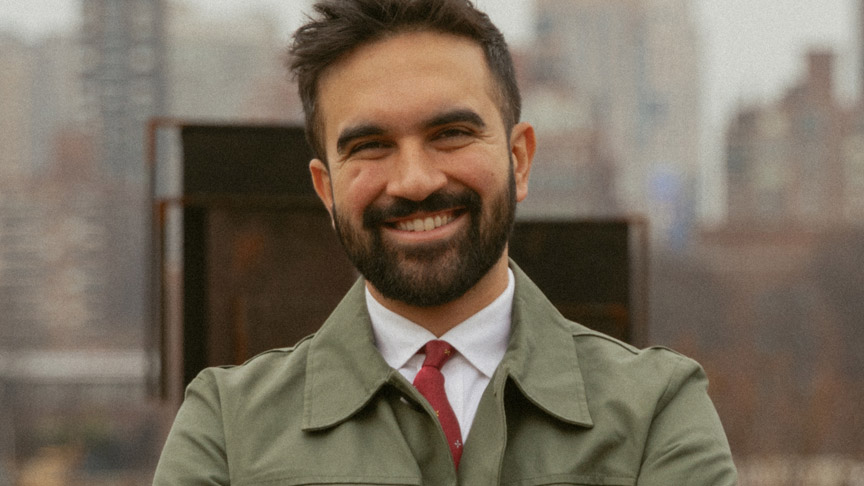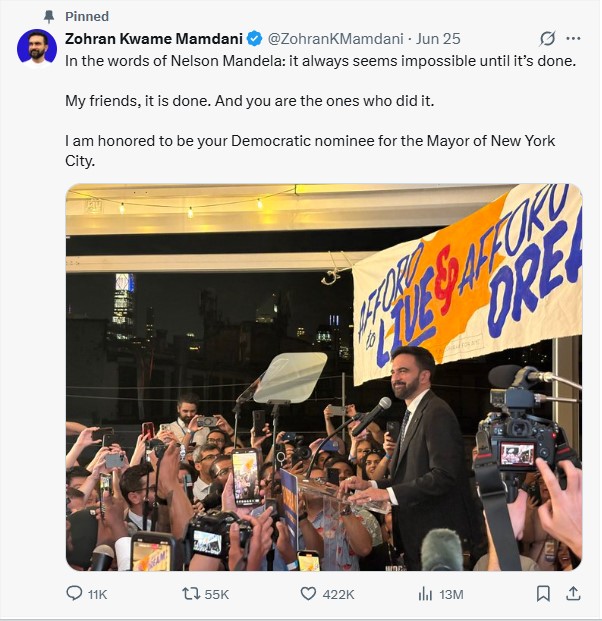
Nadine Osman
Zohran Mamdani, a 33-year-old Muslim democratic socialist and outspoken advocate for Palestinian rights, has defeated former Governor Andrew Cuomo in New York City’s Democratic mayoral primary.
Despite facing a campaign marred by Islamophobic attacks and backlash against his foreign policy stance, Mamdani secured a commanding lead with 43.5 per cent of first-round votes to Cuomo’s 36.4 per cent, prompting Cuomo’s concession before the conclusion of ranked-choice vote tabulations.

If elected in November, Mamdani would become both the first Muslim and the first Indian American to serve as mayor of New York City. Born in Uganda and raised in Queens, Mamdani’s campaign centred on economic equity, climate justice, and transformative public investment, proposing initiatives including universal childcare, fare-free public transit, rent stabilisation for subsidised housing, and city-owned grocery stores. These programmes would be financed through increased taxes on the city’s wealthiest residents. However, what distinguished Mamdani nationally was his outspoken critique of U.S. foreign policy, particularly regarding Palestine. In New York—a city where well-funded pro-Israel lobbies, including super PACs (Political Action Committees) tied to prominent donors like Michael Bloomberg and Bill Ackman, exert considerable influence—Mamdani’s condemnation of Israeli military actions in Gaza placed him in direct opposition to powerful political figures and financiers who launched aggressive advertising campaigns portraying his views as extremist.
“We cannot speak about justice in New York City while ignoring injustice abroad,” Mamdani declared during a rally in Jackson Heights. “Solidarity must be both local and global.”
This stance elicited both strong support and harsh backlash. While establishment Democrats distanced themselves and conservative media labelled him radical, immigrant communities, working-class neighbourhoods, and younger voters—many previously unrepresented in City Hall—embraced his message.
Throughout the campaign’s final stretch, Mamdani was the target of persistent Islamophobic harassment. In June, a Cuomo-aligned super PAC distributed manipulated campaign literature that darkened Mamdani’s skin tone and beard—actions condemned by his campaign and independent experts as blatant Islamophobia. Shortly after, Mamdani received a threatening voicemail about bombing his car, prompting an investigation by the NYPD’s Hate Crime Task Force. These attacks were compounded by anonymous messages branding him a “terrorist” and questioning his American identity, highlighting ongoing racial and religious prejudice in the political sphere.
Addressing these threats, Mamdani stated, “This is not just about politics—it’s about who is allowed to lead, be visible, and belong. But I will not be intimidated out of fighting for justice.”
Cuomo, seeking a political comeback after resigning the governorship in 2021 amid sexual misconduct allegations, entered the race with substantial advantages: name recognition, a broad donor base, and endorsements from centrist Democrats including former President Bill Clinton. His campaign benefited from over $25 million in outside spending, largely from billionaire donors, some with Republican ties. As Cuomo’s poll numbers declined, his campaign adopted increasingly aggressive tactics, running negative ads targeting Mamdani’s foreign policy and economic proposals. However, rather than weakening Mamdani’s support, these efforts appeared to energise his base.
Mamdani’s campaign was notable for its grassroots approach, prioritising multilingual outreach in Urdu, Spanish, and English and engaging communities through neighbourhood gatherings that blended campaign events with social justice discussions. His message resonated nationally, bolstered by endorsements from progressive figures such as Senator Bernie Sanders and Congresswoman Alexandria Ocasio-Cortez, who campaigned alongside him days before the primary. Political strategist Trip Yang described Mamdani’s win as “the biggest upset in modern NYC history,” attributing it to voters’ desire for conviction over compromise.
In his victory speech, Mamdani credited the movement behind his success—a coalition of organisers, volunteers, and marginalised communities long left unheard—and extended an olive branch to supporters of his opponents, pledging to serve all New Yorkers.
With ranked-choice tabulations ongoing, progressive candidate Brad Lander, who finished third, is expected to contribute crucial second-choice votes to Mamdani after endorsing him late in the campaign. Cuomo has hinted at an independent run in the general election, though political analysts view this path as narrow given the Democratic Party’s dominance and incumbent Mayor Eric Adams’ independent re-election bid amid bribery allegations.
Despite challenges, Mamdani’s victory was propelled by extraordinary turnout, with over one million voters casting ballots despite a summer heatwave. Reflecting on the historic night, Mamdani remarked, “This city has shown tonight that it will not be bullied, bought, or silenced. We made history—not just by what we won, but by how we won.”
(Photo credit: Wikimedia)